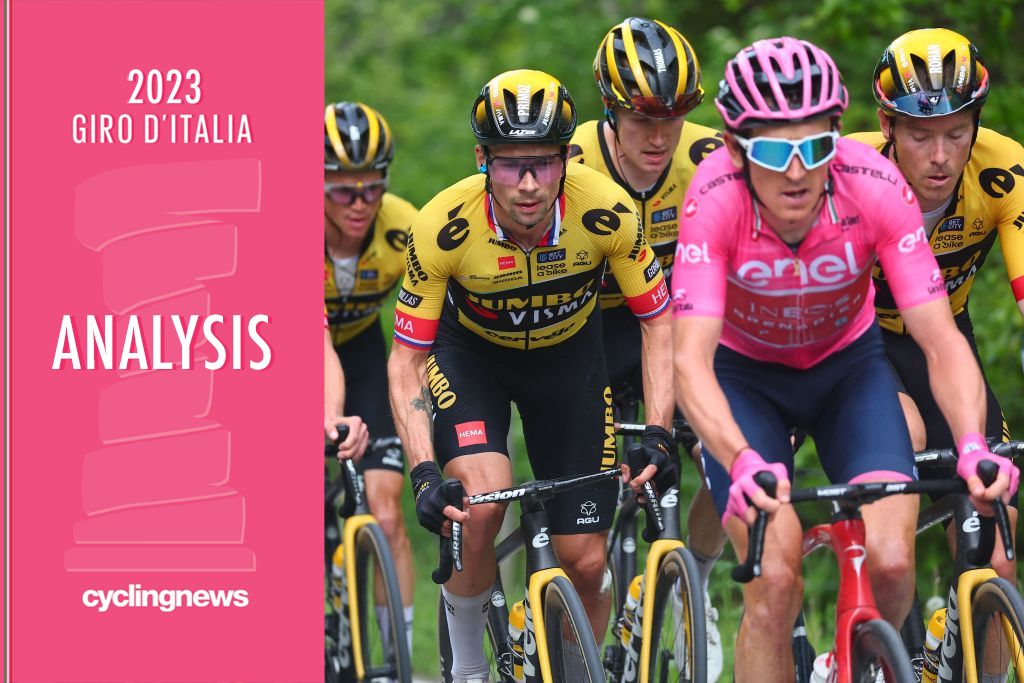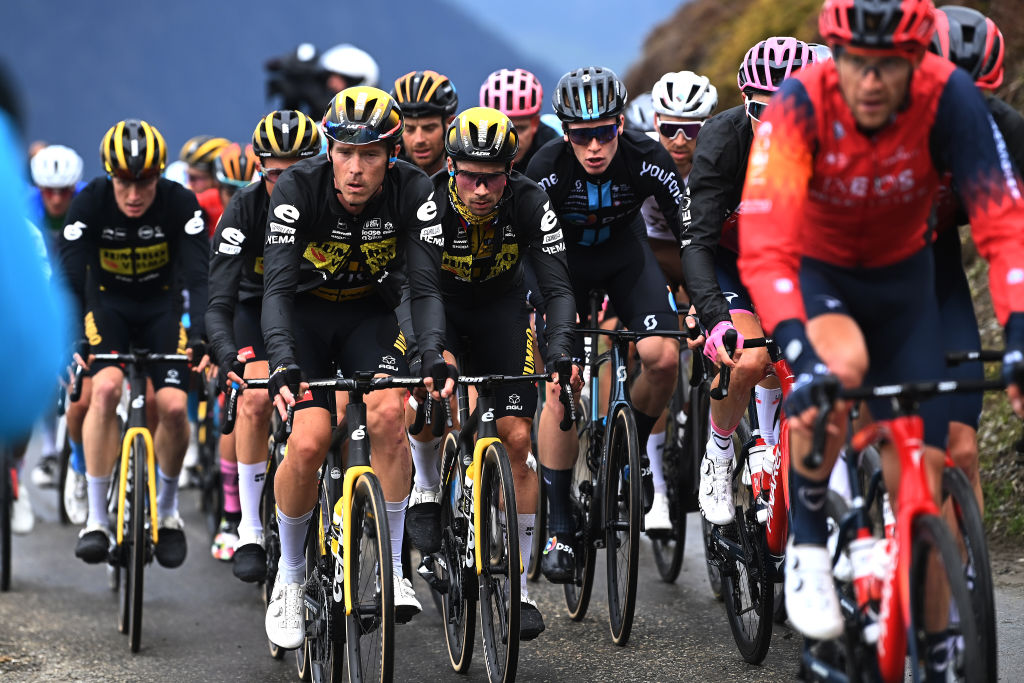'It didn't really kick off' – Stalemate for Thomas and Roglic at Giro d'Italia
First Alpine stage fails to break deadlock between the top two

After a delay, a bus transfer and the inevitable, tiresome polemica that dominated RAI’s television coverage for much of the afternoon, the first Alpine stage of the Giro d’Italia eventually got underway from Le Châble at the foot of the Croix de Coeur. The abridged route promised intensity, but that still couldn’t break the stalemate between maglia rosa Geraint Thomas and Primož Roglič atop the overall standings.
“It was tough, but it didn’t really fully kick off, really,” Thomas said in Crans Montana after he finished alongside Roglič in a sizeable pink jersey group that only splintered within sight of the line. “Our boys controlled the race really well.”
The Gran San Bernardo was removed from the route after the riders of the Giro expressed concerns over the conditions on the descent, a decision that saw the stage reduced to just 74.5km in length, with the gruppo sent up the category 1 Croix de Coeur from the very start.
That configuration conjured up memories of the shortened stage to Sestriere on the 1996 Tour de France, when the race turned on its head in the space of 46 frantic kilometres amid Bjarne Riis’ repeated attacks. That was, however, more than a quarter of a century ago, and cycling’s mood music has changed a little since, at least in some respects.
The steep early ramps of the Croix de Coeur still made for a breathless opening here, mind, with Thomas’ Ineos guard quickly reduced to just two riders, Laurens De Plus and Thymen Arensman. Roglič, meanwhile, still had four Jumbo-Visma teammates for company at that point, and it briefly looked as if the Giro might be about to break open.
The Dutch squad, however, appeared happy to allow Ineos to police the race to the top of the climb and over the other side, by which point Pavel Sivakov had managed to scramble his way back up to the front. Sivakov proceeded to set the tempo in the pink jersey group for much of the final haul to Crans Montana, where Hugh Carthy (EF Education-EasyPost) was the only GC man to try to trouble the status quo.
Thomas and Roglič would finish 9th and 10th on the stage, 1:35 behind the day’s winner Einer Rubio (Movistar). In the overall standings, the Welshman remains two seconds ahead of Roglič, with João Almeida (UAE Team Emirates) third at 22 seconds. Thomas suggested afterwards that, like at Gran Sasso d’Italia a week ago, a headwind on the final climb had discouraged aggression.
The latest race content, interviews, features, reviews and expert buying guides, direct to your inbox!
“There was a bit of headwind for a lot of the climb, so maybe that put off attacks, and they were biding their time,” Thomas said. “Or maybe they couldn’t attack, I don’t know. Maybe Roglič was just happy for me to keep the jersey and do all this [post-stage protocol] for an hour while he goes to the bus and chills and lets us control the stages.”
Thomas’ former teammate Rohan Dennis also cited the conditions on the climb as the reason for the relative inertia on the climb to Crans Montana, but maybe it wasn't the only explanation. In theory, the brevity of the stage promoted attack. In practice, the tightness of the general standings privileged caution. As you were.
“I just think that with the headwind, if someone was sitting on the wheel, it was a lot easier to follow if anyone attacked. You were saving so much energy,” Dennis said. “The GC was sort of nullified there.”
Jumbo growing

Dennis was among Jumbo-Visma’s late call-ups for the Giro after a spate of COVID-19 cases and crashes had forced a revision of the original line-up, and Friday was the Australian’s most notable performance of the race to date. “I feel like I’m coming good. The first part of this race was always going to be hard for me,” said Dennis.
Together with Thomas Gloag, he looked comfortable by Roglič’s side on the Croix de Coeur and Crans Montana before sitting up nearer the summit. Small wonder that his directeur sportif Marc Reef was smiling afterwards.
“Yes, we are very happy with the situation and how it is,” Reef said. “Day by day, we are growing into the race. Riders that came in at the last moment are also growing. You saw Rohan Dennis was still there with the last 20 or 25 riders, and Thomas Gloag was also there and growing. He’s still young, and tomorrow might be different, but it’s encouraging. We’re still confident for the really hard third week.”
Two years ago, when the Dolomite tappone of the Giro was reduced in length due to miserable conditions, the day still proved decisive, with Egan Bernal ending (almost) all debate about his superiority by soloing to victory over the Passo Giau.
At least for now, this Giro seems to be following a strikingly similar to last year’s edition. Unwanted crash and COVID-19 drama notwithstanding, this has been a race high on suspense but relatively low on excitement. Perhaps the tightness of the margins between Thomas, Roglič and Almeida dictates as much.
“I think it’s all building to a big, big crescendo at the end of next week,” Thomas said. Until then, this Giro remains a race of attrition, a game of survival.

Barry Ryan was Head of Features at Cyclingnews. He has covered professional cycling since 2010, reporting from the Tour de France, Giro d’Italia and events from Argentina to Japan. His writing has appeared in The Independent, Procycling and Cycling Plus. He is the author of The Ascent: Sean Kelly, Stephen Roche and the Rise of Irish Cycling’s Golden Generation, published by Gill Books.